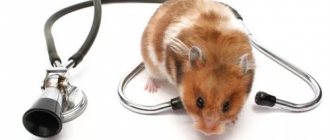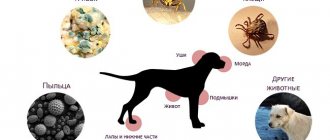Any pet requires special attention and care. This applies not only to cats and dogs, but also to hamsters. When purchasing such a rodent, it is worth studying information about the animal. At the same time, it is important to know not only the methods of care, but also what diseases hamsters suffer from. This will avoid many problems in the future. Particular attention is paid to the pet’s diet, methods of preventing diseases, and so on. But in some cases, health problems still arise in the animal. What to do if your hamster sneezes? How dangerous is this?
It is worth considering that sneezing itself is a natural process. This is not dangerous for the animal. After all, the reason may be hidden not only in the pet’s illness, but also in the presence of an external irritant. Also, do not forget that sneezing in such animals varies. So, what do hamsters get sick with, and how does it manifest itself?
Constant or short-term sneezing
Before answering the question of what to do if a hamster sneezes, you should pay attention to the frequency of this symptom. If this happens once or twice, then you should not think about the disease. In this case, nothing bad happens. The reason for this phenomenon may be hidden in dust or in small particles of food that have entered the animal’s respiratory tract.
How do hamster diseases manifest themselves? Symptoms and treatment of diseases of these animals are interrelated. A wet nose, apathy, lethargy, oily hair, various types of discharge from the eyes, and aggression may indicate a health problem. If such signs are absent, then there is no point in worrying, since the animal is healthy.
But just in case, you should make sure that your pet’s home is not in a draft and that the bedding in it is dry. If a hamster constantly sneezes, this may indicate the development of a disease in the animal. In this case, it is worth showing him to the veterinarian.
Going to the veterinarian
If, after all your efforts, it was not possible to discover the cause of the disease, your hamster sneezes and squeaks, he sniffles or wheezes, then a trip to the veterinarian is inevitable. After all, if your pet’s nose is excessively moist, his eyes are constantly watering, his fur has taken on an unkempt appearance, he snorts all the time, and signs of aggression have appeared in his behavior (or, conversely, your pet has become too passive), then it is likely that he has pneumonia. And the help of a specialist is extremely necessary here.
The veterinarian will help you find out the real reason why your hamster is sneezing. And of course, he will give recommendations regarding further care for your pet.
If you want your pet to always have excellent health, make sure it eats properly and provides the necessary care. Create conditions with a temperature that is comfortable for him at 20-22 C and protect him from drafts.
That's all. Now you know what to do if your hamster suddenly starts sneezing.
https://www.youtube.com/watch?v=l3MSpcqHAKY
moy-homyachok.ru
From time to time we receive disturbing letters from hamster lovers
Owners notice that their small pets sneeze often and a lot. The questions for the editors are, in general, clear: how dangerous is this? What is the nature of hamster sneezing? Do I need to do anything?
Respiratory tract infections. Animals, of course, cannot catch a cold or flu from us. But it’s easy to pick up a respiratory tract infection! A sick hamster is immediately visible: runny nose, half-closed eyes, loss of appetite, lethargy, etc. Plus, of course, sneezing! It is advisable to show the hamster to a veterinarian: if nothing is done, pneumonia may develop, which can be fatal. On the contrary, treatment started in a timely manner will immediately bear fruit. Your pet can get the infection from drafts, food and other hamsters.
Allergic reactions. Don't be surprised: allergies in hamsters are not that rare. Many animals react to the fabric softeners you use to wash fleece bedding. But it doesn’t have to be: anything can act as an allergen! And filler, and some of the ingredients of bagged food, and even dust mites.
You've probably figured out what to do next: try a different filler, a different food, try a general overhaul of the cage, etc.
Nothing helps and your hamster continues to sneeze? Then consult a veterinarian who specializes in working with small rodents.
Other irritants. Inspect the cage first. Do you notice any strong odors? Hamsters, by the way, are very sensitive to outside odors! Many animals cannot tolerate the aroma of pine or cedar shavings used as filler. In addition, small particles often become clogged in the respiratory tract, causing the animal to sneeze.
Now look around the room critically. Do you use electric diffusers that distribute essential oils and other scents? Don't light scented candles? Don't use air fresheners and sprays? Hamsters are critical of these “devices.”
Hamsters can react to powders, cleaning products and other household chemicals. Try giving them up and see what happens. If for some reason this is not possible, then choose another location for the cage.
Maybe the reason is something more serious? It's possible! Thus, hamsters often begin to sneeze when tumors develop in the head and especially the nose. The main difficulty is that tumors are difficult to diagnose right away. It will take a lot of effort and money, which not all owners are willing to do. Examine your pet for bloody nasal discharge. If something like this is present, it means it’s time to sound the alarm.
Pay attention to your pet's behavior. He retains mobility, appetite, and is not tormented by thirst - most likely, there is no reason for serious concern
On the contrary, the hamster is lethargic, refuses to eat, prefers to sleep most of the time - show him to the vet as soon as possible. Perhaps, based on the results of the examination, the veterinarian will prescribe a course of antibiotics or antihistamines.
At the end of the article, we emphasize once again: if possible, choose spacious cages for your hamster! Maintain exemplary cleanliness in the cage. Do not place it in drafts! Then there will be an order of magnitude fewer problems with your pet!
Photo: pixabay.com
ilike.pet
Sneezing as a manifestation of allergies
What to do if your hamster sneezes? First of all, you should pay attention to his diet. Perhaps the animal has an allergy. Most often, this disease occurs as a result of the use of a certain substance. After all, many foods are prohibited for hamsters. This list includes exotic fruits, flour, salty, spicy and sweet. New foods should be introduced into the animal’s diet with caution. After the first feeding, you need to observe the rodent. If the animal’s behavior and appearance have not changed, then the product can be introduced into its diet.
It is worth considering that an allergic reaction can occur not only to natural products, but also to dry food. Therefore, it is necessary to consult with specialists when choosing such food. Indeed, often, in order to save money, bad, unrefined, practically unground and unwashed seeds and grains are added to such compositions.
Allergy is a rather complex disease that can manifest itself several days after exposure to the allergen. In addition, the provoking factor can gradually accumulate in the pet’s body. In this case, the disease may appear even later. It is not recommended to give your pet allergy medications on your own. Only a veterinarian can prescribe them. In addition, a specialist will help you create the right diet.
Why does a hamster sneeze
Sneezing is a protective reaction of the body aimed at removing mucus, dust and other irritating factors from the upper respiratory tract through a sharp exhalation.
The reasons for this reaction in hamsters can be:
- Hypothermia
- Infectious diseases
- Reaction to any allergens
Often sneezing is accompanied by the squeaking of a domestic rodent and is a symptom of the following diseases:
- SARS
- cold
- rhinitis
- bronchitis
- pneumonia
- allergy.
Allergic reactions in hamsters most often occur to food and household chemicals.
Pay attention to the cell
If your hamster is constantly sneezing, then special attention should be paid to the bedding. After all, allergies can manifest themselves not only to foods. You should not use newspapers for bedding. Printing ink contains many chemical components that can adversely affect your pet's health. It is also not recommended to use scented wipes to clean the cage.
Do not wash your hamster's cage with detergents and cleaners intended for the kitchen or bathroom. After all, such compositions contain coarse synthetic components. Once in the animal's body, they can cause the development of serious diseases. In addition, it is not recommended to spray various hairsprays, eau de toilettes and air fresheners near the cage with the animal. All this negatively affects the health of the pet.
Treatment
First aid
Change of filler and heat. The room temperature is maintained at about 24 C, but the air should not be dry. Lots of white paper towels are placed in the cage: this is both material for a warm nest and a hypoallergenic environment. If an allergy is suspected, corn filler is also recommended.
To increase immunity, add liquid vitamins for rodents and ascorbic acid to the water, and drink an echinacea decoction. They also give dry nettle and coltsfoot.
The eyes and nose are cleaned of secretions with a damp cotton pad to make it easier for the animal to breathe. Sometimes a hamster sniffles a lot due to the fact that the nostrils are clogged with dried secretions.
Local treatment
For ordinary rhinitis, local treatments are prescribed: the antiviral drug Roncoleukin 50,000 units, 1 drop 2 times a day and Tsipromed (drops with antibiotic) in the same dosage. The Syrian hamster is larger than the Djungarian hamster, but it is equally difficult for both of them to put drops into the nose: during the procedure, the animal constantly twitches and spins. You can simply place a drop of the medicine on the nose and wait for your pet to inhale the liquid. Then he snorts himself.
Systemic treatment
If you suspect a serious infection, consult your doctor.
But in the absence of a rodent specialist, if a hamster sneezes, every experienced hamster breeder knows what to do at home. Pneumonia is treated with antibiotics. It is not advisable to drink them inside; it can be difficult for an animal with a respiratory infection to swallow. Subcutaneous injections are given with the drug “Baytril 2.5%”. Dose - 0.4 ml (10 mg) per 1 kg of weight. If the hamster weighs 50 g, its dose is 0.02 ml. The drug is administered once a day, in severe cases - 2 times a day, 7-14 days.
It is better to prevent any disease than to treat it. For rodents, this is squarely true, since they are difficult to treat, burning out in a matter of days. A sensitive body and fast metabolism force us to be attentive to any health problem, even if it is a common runny nose.
Why does a hamster sneeze 4.8 (96.67%) 6 votes
Bedding material
Often the cause of allergies is wood shavings or sawdust. The main factor that can provoke sneezing in an animal is small dust particles, as well as aromatic oils contained in wood. There is an opinion that sand should be used as bedding. However, such a statement is far from the truth. Veterinarians do not recommend using any fine-grained structures as bedding. Sand dust often penetrates the respiratory tract of animals, causing not only sneezing, but also serious respiratory diseases. For hamsters, it is worth buying special mixtures that will not harm the animal. Such compositions do not cause allergies and do not penetrate the respiratory tract of pets.
Cold
What should you do if your hamster sneezes very often and does not look very attractive? In this case, you should contact your veterinarian. It should be noted that colds are common among rodents. At the same time, there are plenty of reasons for the development of the disease. In some situations, an animal can become infected from a person with ARVI. To prevent this from happening, it is worth reducing contact with animals if you have such a disease. It is also recommended to wear a sterile gauze bandage while covering your mouth and nose.
A pet can easily catch a cold during bathing, as well as in cases where, after water procedures, its fur was poorly dried. Despite this, the most common cause of a cold in a hamster remains a cage located in a draft.
Control measures
The fight against sneezing consists of treatment (in the case of bronchopneumonia, as well as rhinitis) and elimination of irritants. Of the treatment methods described by hamster breeders, acceptable ones include cleaning the eyes and muzzle from secretions, as well as placing antimicrobial ophthalmic drops, for example, Tsipromed, on the nose twice a day.
The idea of fortifying drinks is pointless; the active ingredients decompose within two hours. It is much more effective to constantly keep dry fortified treats purchased at the pet store in the cage.
It is doubtful whether you need to heat your hamster; you can overdo it and he will get heatstroke, which is more dangerous than sneezing. But it is necessary to protect the animal from drafts. You can put a piece of paper towel in the cage, it will be more fun for the hamster.
If sneezing is caused by allergic phenomena, the following measures should be taken:
- Stop smoking and using cosmetics.
- Remove ornamental plants.
- Replace toilet filler with hypoallergenic one.
- Instead of economy-class feed, use premium quality food.
To prevent a hamster from sneezing, it is necessary to create a comfortable environment for it, protect it from drafts, not treat it with human food, stop treating it like a toy, not bathe it, and not invent other methods of torment. The animal is sensitive to lack of attention, but tolerates excess much worse.
We invite you to join our group on VKontakte or Odnoklassniki, where new articles for pet owners are published.
How to deal with the disease
If the hamster sneezes and squeaks, constantly scratches its nose, you should immediately remove the cage to a place protected from the wind, put in some more napkins, but without drawings or fragrances. The latter are needed so that the pet can hide with them. It is recommended to monitor the room temperature. It should not fall below 25˚С.
How to treat a hamster if he is sneezing due to a cold? In this case, you can give the animal chamomile tea. You can buy it at a veterinary pharmacy. This product contains additional vitamins that can strengthen the animal’s immunity.
If the symptoms are mild, the hamster will recover after a few days. But if your pet constantly sleeps and starts coughing, then you should take him to the vet. In most cases, such signs indicate that the disease is progressing.
Common Causes
In fact, sneezing is a normal reaction of an animal.
- Before eating anything, the animal begins to carefully sniff this product and, of course, if it smells bad or has a strong odor, then naturally the rodent begins to sneeze.
- A hamster sneezes to clear its nose of an unpleasant odor. It is also necessary to take into account the fact that they sniff everything all the time.
- If a dwarf needs to go to the toilet, they will look for the smell of a place where they constantly go, and it is clear that it will not be the most pleasant. The same can be said about Syrian hamsters, but with one difference - imitation of a sneeze. That is, the hamster sharply exhales air to clear the airways of the smell, i.e. Syrian hamster appears to be sneezing.
- Also, in order to understand where they are and what surrounds them, they will also recognize everything by smell in order to distinguish them from each other. In addition, rodents sneeze when they wash themselves. Everything is very simple. Rodents themselves do not smell the most pleasant smell, this is how they protect themselves from predators in nature. If hamsters sneeze, this is not always something bad.
Pneumonia
An advanced cold in a hamster can lead to pneumonia. This can happen within one day. Therefore, it is important to show your pet to a veterinarian in a timely manner. Pneumonia is a serious disease for rodents that can only be diagnosed using radiography. In general, the signs of such a disease in hamsters include the following symptoms:
- disorientation of the animal in space;
- signs of suffocation;
- breathing is difficult and wheezing is heard;
- suppuration of the eyes;
- weight loss.
Hamsters with this disease begin to squeak and sneeze. This indicates that their body is weakened. In case of pneumonia, the veterinarian may prescribe the animal a course of antibiotics, warming, and diuretics. If drug therapy is not started in time, the hamster may die.
Rhinitis
Inflammation of the nasal mucosa due to hypothermia leads to a runny nose in a hamster. And also rhinitis can be allergic. In such cases, its appearance is provoked by dust contained in the bedding or filler.
Signs of rhinitis include:
- Discharge from the nasal passages.
- Sneezing.
- Difficulty breathing.
Since the symptoms of a runny nose closely resemble those of pneumonia, only a veterinarian should make a diagnosis. Natural preparations are used for treatment; in some cases, inhalations will be needed. It is imperative to get rid of the cause of the disease.











